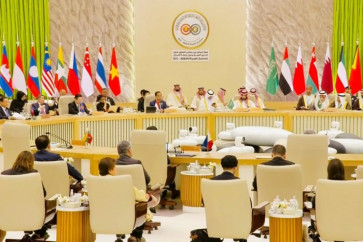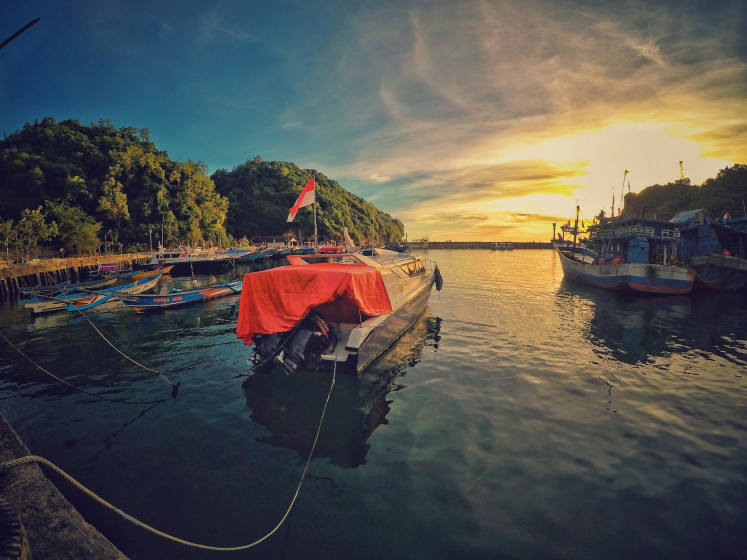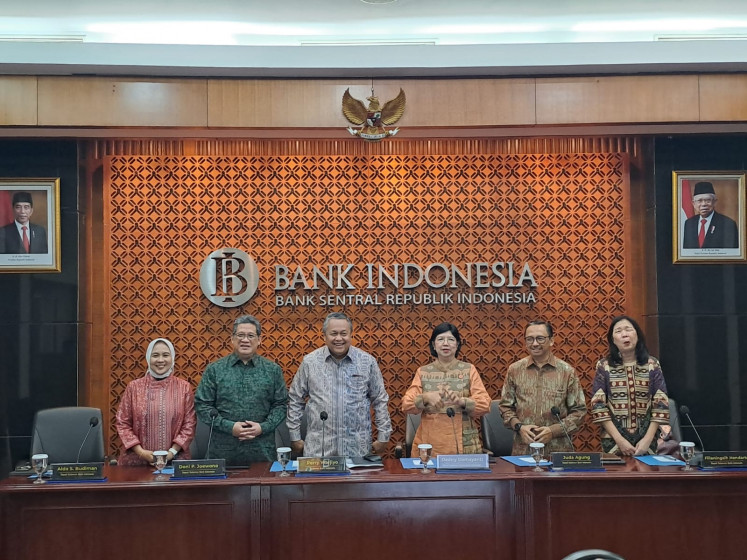Noor Huda Ismail: Changing the minds of ex-combatants
Courtesy of Noor Huda IsmailNoor Huda Ismail said he was once a hardliner
Change Size

Courtesy of Noor Huda Ismail
Noor Huda Ismail said he was once a hardliner. When he studied at Ngruki Islamic boarding school in Central Java, he aspired to join the jihad in Afghanistan.
He wanted Indonesia to be an Islamic state, and joined the Darul Islam – a hardline group Jemaah Islamiyah is said to have splintered from — to support the movement.
Now, the 38-year-old is a moderate Muslim, fighting terrorism by embracing ex-combatants, “de-radicalizing” them using a personal approach, training and courses. He founded the Institute of International Peace Building (Yayasan Prasasti Perdamaian) to support his mission.
The father of one also advises foreign oil companies on security risks, and provides expertise on terrorist movements in Indonesia. One of the reports he co-authored with Carl Ungerer, which predicted the possibility of a violent strike from extremists, was released 24 hours prior to the July hotel bombings in Jakarta.
Huda said counterterrorism should be dealt with as one package, from foiling plots, arresting and trying suspects, to deradicalizing them. The deradicalization process, Huda said, was still lacking in Indonesia. Although the police, collaborating with clerics and ex-militants, has carried out deradicalization programs in the past, Huda said those efforts were not sufficient.
Through the Institute of International Peace Building, he tries to approach ex-combatants, although he said his work was just a tiny portion of what needed to be done.
Since 1999, the police has arrested more than 450 terror suspects. Some of them were released after serving their sentences. These people, he said, could easily go back to their old activities unless they shifted paradigm.
Exposure to different views and more liberal ideologies help Huda become more moderate, he pointed out. He was also brought up in a secular family. In a 2005 opinion piece published in The Jakarta Post, he wrote that his secular father — who worked as a parole officer mainly responsible for handling Islamic militants opposing former president and dictator Soeharto — had enrolled him in Ngruki so he could find out more about the group.
His schooling in a pesantren (Islamic boarding school), made him despise the New Order, which repressed excessive use of group symbols. The pesantren leader Abu Bakar Ba’asyir left for Malaysia as the regime deemed his fervent support for an Islamic state as subversive. Huda said his father was given a hard time for not wanting to vote for the Golkar Party, while his mother was discriminated against for wearing a headscarf.
“I felt that under the New Order, Islam wasn’t given much room,” he said. The Ngruki pesantren taught students to fight evil and be fearless except to Allah, he said.
His life might have turned out differently had he gone to Afghanistan. He failed to fulfill his dream of training in the country most of the terrorists responsible for the Bali bombings and church bombings had graduated from.
But at that time, he wished he had been chosen, he said. “I wanted to go jihad as well, but they didn’t choose me. I wanted to go because joining the jihad would have meant becoming part of history. In Ngruki, they taught us what evil meant and I read books about the greatness of Allah. That inspired me,” he said.
The ustadz (religious teacher) selected pupils they considered most dedicated to join the jihad in Afghanistan against Russian soldiers, Huda said. He joked that perhaps his teachers decided not to choose him because he liked the daughter of one of the Kyai (teacher).
Having missed out on Afghanistan, Huda continued college after graduating from Ngruki.
After living an ascetic life in the dorms of Ngruki for six years, he returned to his hometown in Yogyakarta and studied Arabic literature at the Sunan Kalijaga State Islamic University Yogyakarta. At the same time, he enrolled in a Communications Major at the University of Gadjah Mada. He worked as a tourist guide to support himself, interacting with foreign tourists.
He also left Darul Islam, which he joined while he was in Ngruki, after the group split into Darul Islam and Jemaah Islamiyah, a more radical group seeking to install a pan-Islamic state across much of Southeast Asia.
His views on hardline Islamic movements changed after he started to work as a correspondent for the Washington Post in 2002. “Working as a journalist influenced me a lot because as reporters we had to be critical,” he said.
The first 2002 Bali bombings killed 202 people. Three years later, another bomb exploded killing 88 people. Working for the US publication, he interviewed his former school friends in prison, who ended up choosing a different path in life.
While studying International Security at St. Andrews University in Scotland, on a Chevening Award scholarship, Huda said the deradicalization process in North Ireland had impressed him.
“Ex-combatants are facilitated and given courses,” he said.
Upon his return, he founded the Institute of International Peace Building and started a deradicalization program.
“Right now, we only work with 10 ex-combatants,” he said. The ex-combatants, spread across Jakarta, Surakarta, Semarang and Surabaya have experienced life in prison. The absence of deradicalization programs in Indonesia, he said, was worrying.
He worked on a prawn culture with them, and taught them how to trade online. “It’s giving them a normal life,” he said. The institute also worked in eight prisons. He said the only way to prevent the ex-combatants from joining hardline movements again was to help them have a normal life again.
He chooses to deal with ex-combatants labeled as in the “gray” area.
“White JI [Jemaah Islamiyah combatants] use violent methods. There are gray JI, and there are black JI, who have changed sides and work with the police,” he said.
“My analysis concludes that these people are considered tainted. They’ve revealed the secrets of the group to the court and authorities are constantly watching them,” he said.
“They are not accepted in their small [extremist] groups and stigmatized in bigger groups [society]. They cannot fit in either environment,” he said, adding that desperation could lead them to return to their old habitat.
Ex-Jemaah Islamiyah member Nasir Abas, who now helps the police analyze the JI group, said he supported Huda’s personal approach.
“Being a former Ngruki student makes it easier for him to approach former combatants and persuade them to change their ways,” he said.
Nasir added that Huda and him were fighting the same war in a different way. “He takes a more personal approach while I work with the police.”
Huda is currently writing a book titled My Friend the Terrorist, which tells the story Utomo Pamungkas alias Fadlulah Hasan, who was sentenced to life imprisonment for being involved in the first Bali bombing.
For Huda, this is the way to fight against terrorism in Indonesia. Being a former student of Ngruki acquainted with some of the people involved in terrorist activities has made the issue personal to him.
Another reason for joining the fight against terrorism using a more personal approach? His one-year-old son. “I don’t want him growing up to be a terrorist.”









